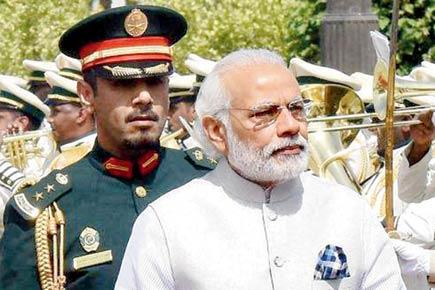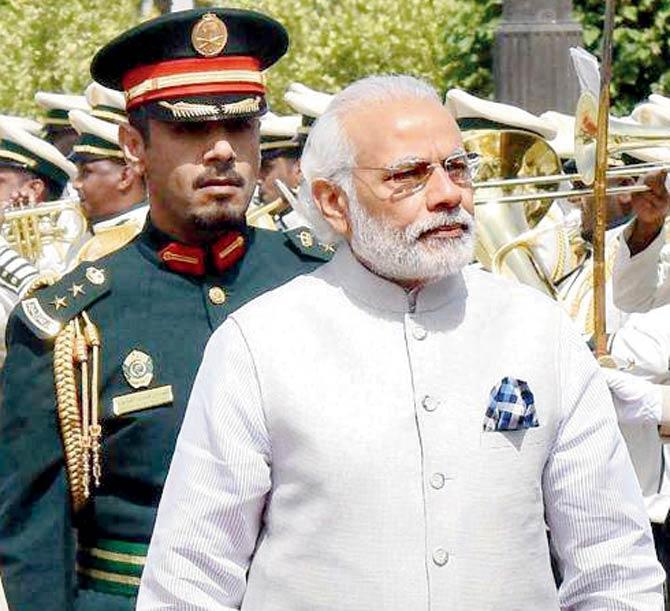The Goods and Services Tax (GST) Bill, to implement a pan-India tax for a complete overhaul of the extant indirect tax regime, has been approved by the Lok Sabha, and is currently awaiting approval in the Rajya Sabha

Wooing investors with promise of an easier business environment and stable tax regime, Prime Minister Narendra Modi yesterday said retrospective taxation has been made a thing of the past but he is “not able to do anything” on two cases inherited from the previous government as they are “sub-judice”.
ADVERTISEMENT

PM Narendra Modi is currently on tour in Saudi Arabia. Pic/PTI
Inviting Saudi businesses to come and invest in India’s defence, energy, railway, health and agriculture sectors, Modi also said that a common indirect taxation regime in form of GST (Goods and Services Tax) was “about to happen”. He, however, refrained from giving any specific timeframe. Addressing a select group of Saudi and Indian business leaders on the last day of his two-day visit to Saudi Arabia, Modi said his government has opened up many sectors to foreign investment and India stands out as a “beacon of hope” amidst global economic slowdown.
Prime Minister further said his government was trying to strengthen the banking network in India by freeing them from non-performing assets (NPAs) of state-run electricity companies whose liabilities had gone up significantly.
Modi said India has taken major policy initiatives to create favourable environment for investors besides removing administrative bottlenecks. In this regard he said the World Bank has placed India on 12th position in the list of countries that had ensured ease of doing business.
Economic crisis
“Today, the world is facing a very deep economic crisis and in this situation, India is a beacon of hope. Whether it is World Bank, IMF or credit rating agencies, all of them consider India one of the fastest growing economies,” he said. On roll out of the much-delayed GST, Prime Minister said, “GST will happen. I cannot give a timeframe, but it will happen. It was our commitment, and it is about to happen.”
To a question on retrospective tax, Modi said it will never be brought back again. He said two cases were ‘sub-judice’ and it would not be proper for him to comment further.
“As far as retrospective tax is concerned, it is a thing of the past. We have repeatedly said this in Parliament and I am repeating here again today.
“There were two incidents that took place under the last government. These are sub-judice. So, I am not being able to do anything on them. In one of the cases, positive outcome has come. Retrospective tax does not exist in India anymore. It has become a thing of the past. It won’t come,” he said.
Although Prime Minister did not specifically name the pending cases, the major retrospective tax disputes include those involving Vodafone and Cairn.
“I think in international relations, the taxation system should be predictable. If somebody wants to come (to India) after 10 years, he should know India’s tax structure is like this. That’s why we are working on a long-term tax system and we are implementing and I do not think there will be any problem in that,” Modi said.
 Subscribe today by clicking the link and stay updated with the latest news!" Click here!
Subscribe today by clicking the link and stay updated with the latest news!" Click here!






